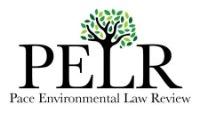Symposium on Reconceptualizing the Future of Environmental Law
Reconceptualizing the Future of Environmental Law
March 20, 2015
New York State Judicial Institute at Pace Law School
78 North Broadway, White Plains, NY 10603
On March 20, the Pace Environmental Law Review invited environmental law professors, practitioners, and students for a crucial conversation on redefining the field of environmental law. The Symposium focused on the continued expansion of environmental law into distinct areas of the law, requiring an increasingly multidisciplinary approach beyond that of traditional federal regulation. For information on the Symposium, please see the video and agenda below.
| Agenda | |
| 8:30–9:00 | Registration and Continental Breakfast for Speakers, private roundtable participants, and invited guests |
| 9:00–10:00 | Private Roundtable Discussions |
| 9:45–10:00 |
General Registration and Check-in |
| 10:00–10:20 | Welcoming Remarks |
| 10:30–11:30 |
Speaker: Daniel Farber (Sho Sato Professor of Law and Co-director of the Center for Law, Energy and the Environment, Berkeley Law School) From Sources to Systems Commentary by: Michael Pappas (Assistant Professor of Law, University of Maryland Francis King Carey School of Law) Karl Rábago (Professor of Law and Executive Director of the Energy and Climate Center, Pace Law School) |
| 11:30–12:30 |
Speaker: Carmen Gonzalez (Professor of Law, Seattle University School of Law) The unprecedented degradation of the planet’s vital ecosystems is among the most pressing issues confronting the international community. Despite the proliferation of legal instruments to combat environmental problems, conflicts between rich and poor nations (the North-South divide) have compromised international environmental law, leading to deadlocks in environmental treaty negotiations and noncompliance with existing agreements. This presentation will discuss the historic origins of the North-South divide, several contemporary manifestations, and potential ways of bridging the divide. Commentary by: James Salzman (Samuel F. Mordecai Professor of Law and Environmental Policy, Duke Law School) Ann Powers (Professor of Law, Pace Law School) |
| 12:30–1:30 | Lunch sponsored by ABA Section of Environment, Energy, and Resources (SEER) |
| 1:30-1:45 |
Speaker: Scott Schang (President, Environmental Law Institute) Environmental Law Institute's Findings on the Future of Environmental Law |
| 1:45–3:15 |
Roundtable Discussion Moderator: Nicholas A. Robinson (Pace University Professor for the Environment) Speakers: Todd Aagaard (Professor of Law, Villanova University School of Law) David Cassuto (Professor of Law, Pace Law School) Jason Czarnezki (Gilbert and Sarah Kerlin Distinguished Professor of Environmental Law, Pace Law School) Alexandra Dapolito Dunn (Executive Director and General Counsel, Environmental Council of the States) Daniel Farber (Sho Sato Professor of Law, Berkeley Law School) Carmen Gonzalez (Professor of Law, Seattle University School of Law) Michael Pappas (Assistant Professor of Law, University of Maryland Francis King Carey School of Law) Margot Pollans (Professor of Law, Pace Law School) James Salzman (Professor of Law and Environmental Policy, Duke Law School) Michael Vandenbergh (Professor of Law, Vanderbilt Law School) |
| 3:15-3:30 | Coffee and tea break |
| 3:30–4:30 |
Keynote Speech Speaker: Michael Vandenbergh (David Daniels Allen Distinguished Chair of Law and Director of the Climate Change Research Network, Vanderbilt Law School)
|
| 4:30–5:30 | Reception |


